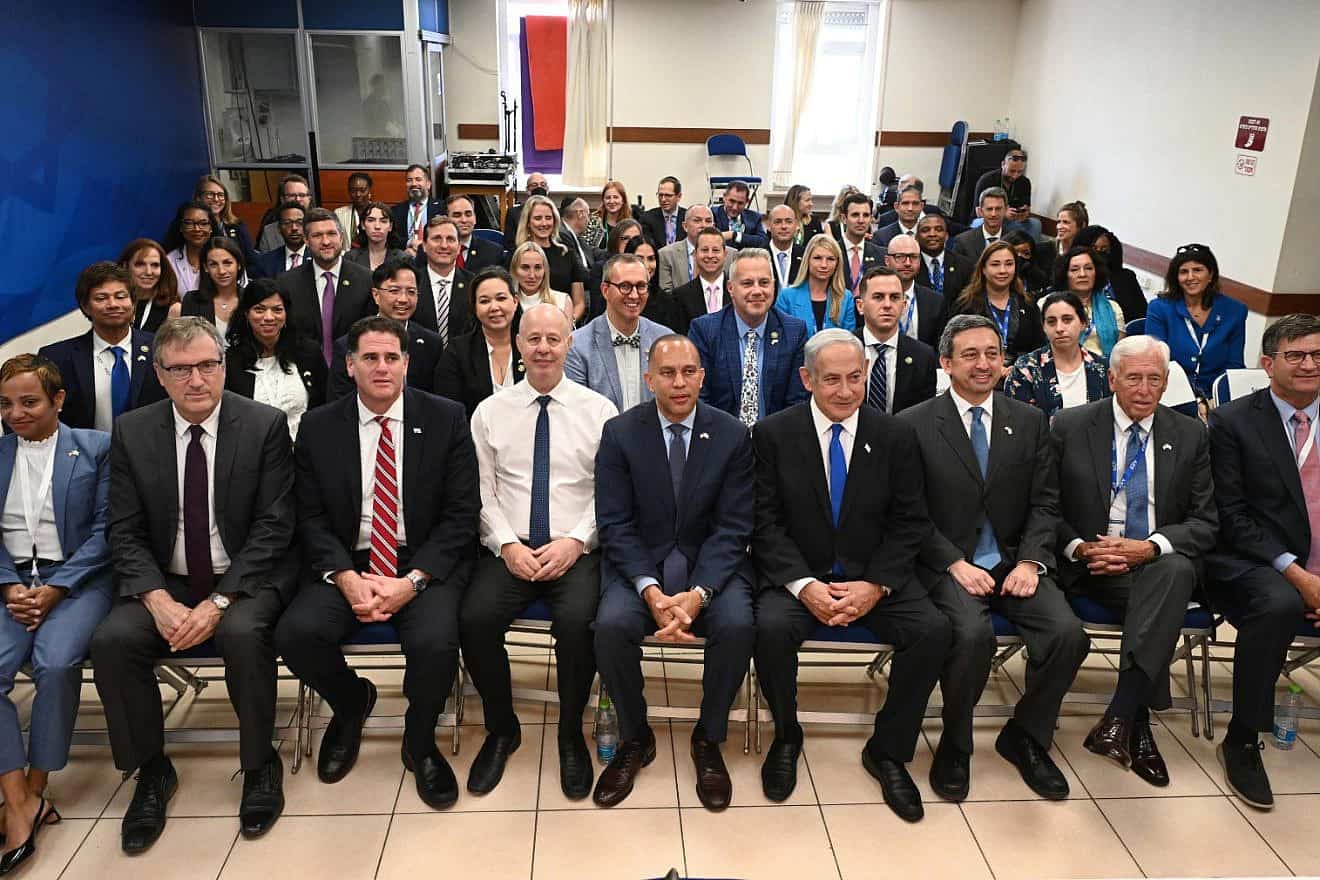In recent years, members of the U.S. House of Representatives have frequently traveled to Israel on fully funded trips sponsored by the nonprofit arm of the American Israel Public Affairs Committee (AIPAC). While these trips are not necessarily occurring en masse, they have become a regular occurrence, with dozens of lawmakers participating in 2023 and 2024 alone.
Critics argue that these excursions are more than just educational junkets—they are sophisticated propaganda tours orchestrated by Israel to bolster its image and influence American policy.
A Propaganda Tour: Shaping Lawmakers’ Perceptions
The trips, organized by AIPAC’s American Israel Education Foundation (AIEF), are carefully curated experiences. Lawmakers meet with high-ranking Israeli officials, such as Prime Minister Benjamin Netanyahu, and are shown sites that emphasize Israel’s security challenges—like the faces of hostages taken during the October 7, 2023, Hamas attack. However, these itineraries often exclude perspectives from Palestinians, such as meetings with Gaza residents or the Palestinian Authority. This one-sided narrative has led critics to label the tours as propaganda, designed to align U.S. policymakers with Israel’s conservative government.
Israel has a clear incentive to invest in such efforts. The nation is losing ground in the “culture war,” particularly on social media, where content highlighting its military actions—such as airstrikes, settlement expansion, and displacement of Palestinians—dominates discourse. Following the October 7 attack, which killed over 1,200 Israelis and prompted a massive military response in Gaza, global criticism has intensified. Israel’s leadership, aware of this shift, uses these congressional tours to counter negative perceptions and reinforce its narrative of self-defense and regional stability.
Israel’s Actions in the Region: A Source of Controversy
Critics point to a litany of actions that fuel anti-Israel sentiment: shooting lethal rounds at civilians, including women and children; obstructing aid in combat zones; displacing populations; seizing homes for settlement construction; and bombing refugee camps. These allegations, widely documented by human rights organizations, paint a picture of a nation prioritizing territorial expansion over international norms.
The “Greater Israel Project” refers to this perceived strategy of consolidating control over contested territories, while the “Clean Break Memo”—a 1996 policy paper—advocates for Israel to abandon peace negotiations and pursue regime change in hostile neighbors, notably Iran. Israel’s current push for a hardline U.S. stance on Iran aligns with this vision, framing Iran as a mutual threat to justify its policies.
The Financial Pipeline: U.S. Aid and AIPAC’s Role
The U.S.-Israel relationship is underpinned by significant financial support. America provides Israel with approximately $3.8 billion in military aid annually, a figure that has reportedly surged to over $12 billion in 2024 due to the ongoing Gaza conflict. Critics allege that Israel funnels a portion of this aid back into the U.S. through AIPAC, which then spends heavily to influence American politicians. AIPAC has invested over $100 million in U.S. political campaigns, lobbying for policies like continued military aid to Israel and sanctions on Iran.
This creates a controversial feedback loop: U.S. taxpayer money strengthens Israel, which then uses its resources to lobby Congress through AIPAC, ensuring the aid continues. Notably, AIPAC is not required to register under the Foreign Agents Registration Act (FARA), a law mandating transparency for agents of foreign governments. This exemption allows AIPAC to operate as a domestic lobbying group despite its close ties to Israel, raising questions about accountability and foreign influence in U.S. politics.
Nuclear Ambiguity and Legal Violations
Israel’s nuclear program further complicates the relationship. Widely believed to possess nuclear weapons—allegedly developed with uranium stolen from the U.S. in the 1960s—Israel refuses to join the Non-Proliferation Treaty (NPT), unlike most nuclear states. Yet, it continues to receive U.S. aid, potentially violating the Foreign Assistance Act, which restricts funding to countries developing nuclear weapons outside international safeguards. Critics argue this double standard undermines U.S. credibility, especially as Israel demands oversight of Iran’s nuclear activities while evading similar scrutiny.
False Flags and the October 7 Narrative
Some critics allege that Israel engages in “false flags” like the October 7 attack, suggesting it may have allowed or staged the Hamas assault to justify its subsequent campaign in Gaza. While mainstream sources do not support this conspiracy theory, the October 7 attack undeniably escalated the conflict, leading to a devastating Israeli response that has killed thousands in Gaza. Whether a false flag or not, Israel has leveraged the event to rally international support, including through its congressional tours, while critics decry the humanitarian toll as evidence of war crimes.
Treason or Misplaced Loyalty?
The assertion that U.S. politicians are committing treason by prioritizing Israel’s interests over America’s is a grave charge that demands scrutiny. Treason, as defined in the U.S. Constitution (Article III, Section 3), involves levying war against the United States or providing aid and comfort to its enemies. Accepting fully funded trips to Israel, organized by AIPAC’s American Israel Education Foundation, and aligning with Israel’s policy goals—such as its push for regime change in Iran or unchecked military actions in Gaza—may not meet the strict legal threshold for treason. However, these actions raise serious concerns about lawmakers’ loyalty when they consistently favor a foreign nation’s agenda over the interests of American citizens.
By accepting millions in campaign contributions from AIPAC, which critics argue is fueled by U.S. aid to Israel, lawmakers create a cycle of dependency that undermines national sovereignty. This financial influence, coupled with Israel’s exemption from registering under the Foreign Agents Registration Act (FARA), allows it to exert disproportionate control over U.S. policy without transparency.
When politicians advocate for policies that perpetuate Israel’s alleged war crimes—such as bombing refugee camps or obstructing humanitarian aid—while ignoring growing domestic opposition, they risk betraying the public’s trust and prioritizing a foreign government’s objectives over America’s moral and strategic interests. This dynamic, particularly as younger voters and progressive Democrats voice outrage over Israel’s actions, fuels accusations that such conduct is tantamount to treason, even if it falls short of the legal definition.









Share:
The Trump Administration’s $548M Funding Cut to UCLA: A Constitutional Clash Over Pro-Palestinian Protests
The $50 Million Bounty on Maduro: A Geopolitical Firestorm Fueled by Israel’s Influence